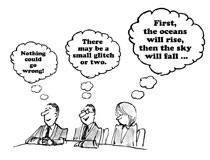Perceiving Perception
 “There are things known and there are things unknown,
“There are things known and there are things unknown,
and in between are the doors of perception.”
~~ Aldous Huxley, British Author 1894-1963
Understanding others can open doors to better communication, cooperation, and empathy. Empathy comes from one of the five dimensions of Emotional Intelligence and the external component of Emotional Quotient – Social Awareness. Having empathy makes us better people. But can we truly “walk a mile in another person’s shoes?” Can we truly understand another person’s behaviors, thoughts, feelings, motivators, and mental states?
According to a study by the University of Chicago and Northwestern University in the United States and Ben Gurion University in Israel, that may not be as easy as it sounds. When we attempt to understand another individual, we usually do so from our own perspectives. When in reality what we need to do is “get” another person’s perspective. According to the study, the best way to do that is to simply ask. When we ask the individual, we then receive additional information we previously did not have and accuracy and understanding now increases about another person’s behaviors, thoughts, feelings, motivators, and mental state.
To complicate matters even further in our quest in perceiving perception, we often have a poor perception of our selves! {graphic}
As with so many journeys in life, the road to understanding others needs to begin with self-understanding or self-awareness. One of the best ways to understand self and others is using valid, reliable, and scientifically-based assessments. Here’s why. Let’s say you ask someone if he or she wants the promotion of whatever…and this individual is still in the pangs of a devastating defeat, life-changing scenario, or the failure to attain a promotion for a different position. Because of the defeat, this individual likely has cloudy self-judgment and may state, “No, I’m not ready, I lack the skills, I’m not smart enough…” the list of self-defeating excuses can go on and on. On the other side of perception are the people, who do lack what it takes, but whose judgement is clouded by ego and perceive they are the best at everything. Think about other scenarios we see every day at work.
Fred thinks Bill is always “buttering-up” the boss because he works hard, grabs at every project the boss throws his way, and even stays late. Betty thinks Sarah is a “goody two-shoes” because Sarah participates in and may even initiates charitable volunteer opportunities for the community. Hank thinks Alice is “mentally slow” because she takes time to think about answers and comments before she gives them. Lucy thinks Larry is superficial because he is so enthusiastic about almost every idea, project, or person. Peggy things Paul is a “nitpicker” because he wants every “t” crossed and every “i” dotted.
The truth is that each of these individuals are exhibiting their natural behaviors or motivators or doing what drives them. Maybe Paul is more aggressive and assertive than Fred or maybe he grew up in poverty and wants to spare his own family that same fate. Sarah is probably driven by a sincere desire to help others. Alice simply things about what she wants to say and isn’t mentally slow at all. In fact, she is probably smart to “weigh her words.” Larry may be a highly enthusiastic and trusting individual. Paul simply doesn’t want to make mistakes or even wants to spare the organization from a lawsuit.
Perceiving these behaviors and drivers is not easy. Taking a deeper dive in understanding others simply by asking or by participating in a team debrief of assessments is well worth the effort. Of course, any time any of the above behaviors or drivers are taken to extreme, conflict will ensure. That’s why it’s important to ensure that managers are good coaches.
We sometimes perceive our perceptions to be true. However, now we can see more clearly that our perceptions can sometimes be like engaging in virtual reality and the distance between our perceptions and reality can cause conflict, poor communication, and lost productivity. It is best to do a reality check by using assessments or simply asking. I perceive that you’ll agree with my perception - that’s what good communication is all about.
Thank you for reading this blog. To help your teams with building better understanding Let's Get Started!
Graphic credit: Bigstock.com
Source:
Clark, D. (2018, April). Important Distinction s Between EQ and IQ. TTI SuccessInsights.com
Livni, E. (2018, July). There’s Only One Way to Truly Understand Another Person’s Mind. Quartz Media, LLC.
Pogosyan, M. (2016, June). Understanding Others: What is behind the brain’s ability to empathize? Psychology Today